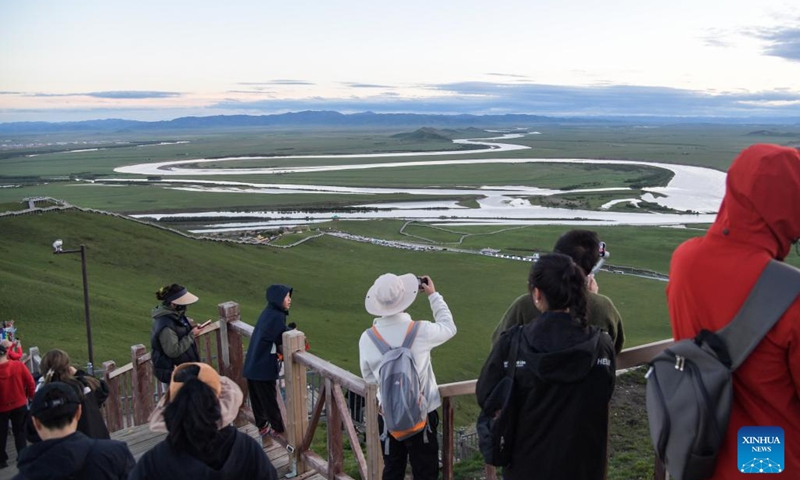
Tourists enjoy the view of the zigzag watercourse of the Yellow River in Ruoergai County of Aba Tibetan-Qiang Autonomous Prefecture, southwest China's Sichuan Province, June 8, 2024. People enjoy the 3-day holiday of the Dragon Boat Festival, also called Duanwu Festival, which falls on June 10 this year, via various activities across the country. (Photo: Xinhua)
China witnessed a sustained tourism boom during the three-day Dragon Boat Festival holidays that ended on Monday, with robust growth in spending and travel, according to data from several online travel platforms on Monday, adding to a growing list of indicators pointing to a continuous recovery of the Chinese economy.
During the Dragon Boat Festival, traditional cultural activities across the country drew crowds, as many localities organized a series of activities to both celebrate the holidays and boost local tourism markets. Analysts said the growing popularity of cultural activities underscores the huge potential for China's tourism industry and consumption, which is essential to boosting the vitality of the world's second-largest economy.
Meanwhile, inbound and outbound tourism also saw a remarkable boom during the holidays, despite being short. The robust growth in cross-border travel is supported by China's proactive efforts to further open up its tourism market, including waiving visa requirements for visitors from many countries, analysts noted.
During the holidays, a total of 110 million trips were made, up 6.3 percent year-on-year, and total domestic travel spending grew by 8.1 percent year-on-year to 40.35 billion yuan ($5.57 billion), according to data from the Ministry of Culture and Tourism on Monday.
On Monday, China's railway system was expected to carry 15.9 million passenger trips, compared to about 12.5 million trips on Sunday, as many were returning from holidays to work. Due to the massive volume, China State Railway Group said it planned to add 1,071 passenger trains on Monday.
Across the country, there were bustling scenes at major tourist attractions, roads and bridges. Many flocked to places like South China's Guangdong and Central China's Hunan to watch dragon boat races, a traditional activity for the festival. The Hong Kong-Zhuhai-Macao Bridge, which connects the Hong Kong and Macao special administrative regions to the mainland, saw record-breaking traffic. Between Saturday and noon on Monday, more than 227,000 passengers and over 42,000 vehicles entered the mainland through the bridge, both of which are fresh records, according to China Media Group.
Spending also increased during the three-day holidays. Average daily spending on food delivery platform Meituan surged by 69 percent compared to 2019, according to data provided by the platform. Guangdong, East China's Jiangsu, East China's Zhejiang and Beijing topped the list of online spending, Meituan said.
Data from Chinese online travel services platform Fliggy showed that both bookings and average spending during the holidays surged compared to that of 2023. Bookings for overseas trips also increased significantly, with bookings for overseas car rentals soaring by more than 200 percent year-on-year, Fliggy said in a report sent to the Global Times on Monday.
The strong travel and spending numbers during the Dragon Boat Festival holidays continued a surging trend of tourism recovery since the start of the year, which further underscored the rebound in consumption and the strong vitality of the Chinese economy, according to analysts.
The recent data showed that consumers' consumption power is constantly improving, Cong Yi, a professor at the Tianjin School of Administration, told the Global Times on Monday. "The improvement of consumption power and the upgrading of consumption structure are the keys to driving economic growth on the demand side and are crucial to stabilizing the overall economic growth trend."
A growing number of economic indicators have showed that China's consumption market and the overall economy continued on a solid recovery trend. In the first quarter of 2024, China's retail sales, the main gauge of consumption, jumped by 4.7 percent year-on-year, according to official data. China imports and exports have also seen strong growth, with exports surging 6.1 percent year-on-year during the first five months of the year, official data showed on Friday.
Thanks to the strong economic indicators, both domestic and overseas expectations for China's economic growth have improved significantly. At the end of May, the IMF announced an upward revision of its forecast for China's GDP growth in 2024 and 2025, projecting growth of 5 percent in 2024 and 4.5 percent in 2025, both up 0.4 percentage points compared to the multilateral lender's previous forecast. The IMF cited strong GDP data in the first quarter and policy measures for its revision.
Huge potential
Analysts said boosting consumption remains a top priority for Chinese policymakers, as consumption is the biggest growth drivers. And as the strong holiday spending figures show, there is still huge potential for China to boost the tourism market, the analysts said.
Among the highlights of the tourism boom during the holidays is the rising popularity of traditional activities such as dragon boat races. As this year's Dragon Boat Festival holidays coincide with the Cultural and Natural Heritage Day, many localities seized the opportunity to organize cultural activities to attract visitors. In Beijing, for example, tourism authorities organized more than 2,100 cultural and tourism activities during the holidays. The capital city's parks received more than 4 million visitors, up 27.2 percent year-on-year.
Moreover, foreign tourists visiting famous tourist attractions and enjoying Chinese traditional food across China also became a highlight during the holidays, with many netizens claiming that inbound travel has fully recovered. Official data also painted a similar picture for the inbound tourism sector. While a final tally has not yet been released, the National Immigration Administration predicted that the country will have about 1.75 million trips each day during the holidays, up 32.5 percent year-on-year.
The surge is due to China's recent policy measures to facilitate cross-border travel and the rising influence of Chinese culture among global travelers, analysts said.
"China has made it more convenient for global travelers to visit the country. But convenience is not the only reason international travelers are coming to China. Attractiveness of China as well as convenience are both critical," Zhang Lingyun, a member of the academic committee of the China Tourism Academy, told the Global Times on Monday, noting that China has turned its traditional culture into attractive tourist products that have gained global popularity.
In recent months, China has announced visa-free policies for visitors from many countries in Asia, Europe and beyond. Chinese authorities have also taken various efforts to improve payment services for foreign nationals, including streamlining procedures for opening bank accounts and signing up for online payment services. In addition, Chinese airlines have also continued to increase flights to and from overseas destinations to boost capacity, experts said.
The recovery in inbound travel underscores not only China's attractiveness as a tourism destination, but also the country's efforts to boost people-to-people exchanges, even as some Western countries have tightened restrictions on foreign visitors, experts said.
"The US and other Western countries are seeking to decouple from China in the manufacturing industry, but when it comes to tourism, it is hard to stop the flow of people," Zhang said.

